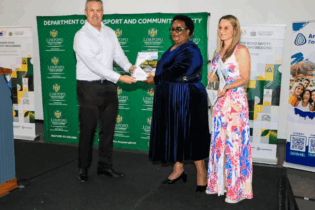However, she admitted there were thorns among the roses. “We have to acknowledge that the lack of professionalism in the industry by some operators has cast the industry in a negative light. Overloading, [the] operation of unroadworthy vehicles and intimidation of drivers to drive unmaintained vehicles and to exceed driving hours, has done a lot to damage the already waning credibility of this industry,” she conceded.
Naidoo said the RFA was perturbed by recent comments made by the Department of Transport (DoT). [The DoT has indicated] that they will legislate as they see fit. It is a sign of what’s to come. More importantly, we have seen legislation coming into effect that has already been decided upon by the legislator, with consultation being a mere procedural process,” she added. “We have learned that consultation is simply a regulatory process and is not a negotiation. There is no obligation to justify proposed legislation or to consider stakeholder’s concerns. It is the legislators right to legislate and regulate. However, it must do so in order to achieve a legitimate purpose, with the acid test being whether the legislation serves a legitimate purpose and whether there are means to achieve such. In many instances, this is highly questionable,” she said. [New] Legislation – such as the proposed truck ban – will not achieve the desired outcome of reducing road carnage, congestion and emissions. In fact, it will more than likely create the opposite effect. Something as simple as more effective law enforcement would be a better solution,” she proposed. Continuing she said, “The threat to the trucking industry has never been more apparent. The need for the industry to stand together and prevent the effects of harmful legislation has never been so great. It is essential that industry views are taken into account.” Naidoo urged the trucking fraternity to participate in the conference, so that its views could be heard and translated into the RFA’s lobbying strategy. “The RFA is your voice and speaks on your behalf,” she concluded.
CEO of the Road Freight Association (RFA), Sharmini Naidoo, says the threat to the trucking industry in South Africa has never been more apparent that it is today.
Naidoo was speaking at the RFA’s annual Road Freight Convention, held at the Champagne Sports Resort in the central Drakensberg this week.
Truck centricity is the theme of this year’s event. “Truck centricity is a conference centred on the hard hitting issues affecting the trucking industry and there certainly are many,” she said.
Naidoo listed truck bans, reduced driving hours – without reduced pay for drivers – reduced speed limits, loadshedding, consignee/consignor legislation, volatility and unpredictability of the labour market, government intervention to outsource non-core operations with preference given to employees, contribution to a dedicated road infrastructure fund slipped into the proposed BEE Charter, funding of government agencies and structures and AARTO as the major issues of the day. “What’s next?” she asked.
“What more does an already over-regulated industry have to contend with? We’re seen as the ‘bad boys’ in the industry on the roads that takes lives and [occupy] motorist’s space – not to mention contamination of the air,” she lamented. Naidoo went on to say that the trucking industry in South Africa was not recognised for the “valued and meaningful” role it plays in the economy and its positive contribution to the country’s GDP.






